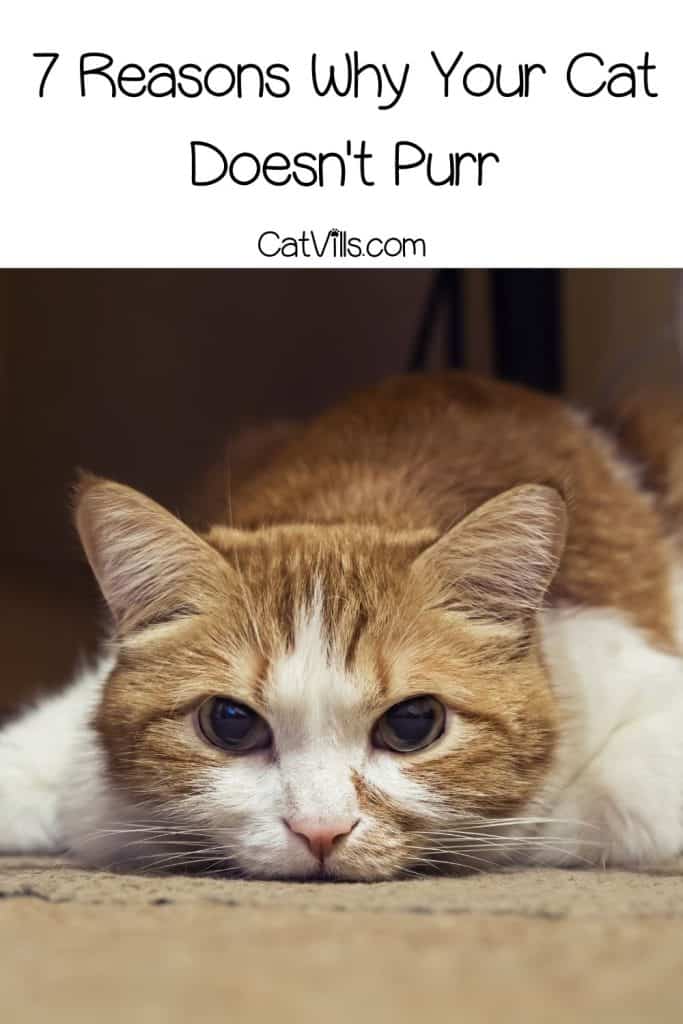Last Updated: 2 years ago
Are you baffled that your cat doesn’t purr when petted and wonder why?
Purring is one of the cutest cat sounds, so it’s natural for any cat owner to be surprised when their cat stays silent.
Fortunately, we’re here to talk about why your kitty isn’t interested in purring.
Just keep reading.
7 Reasons Why Cat Doesn’t Purr
Since purring has so many benefits for cats and humans alike, it’s natural to be worried when you discover that your cat never makes such sounds.
So, why isn’t my cat purring? The lack of purring is related to your cat’s character, but it can also signify that something is wrong with your furry friend.
#1 Your Cat’s Temperament
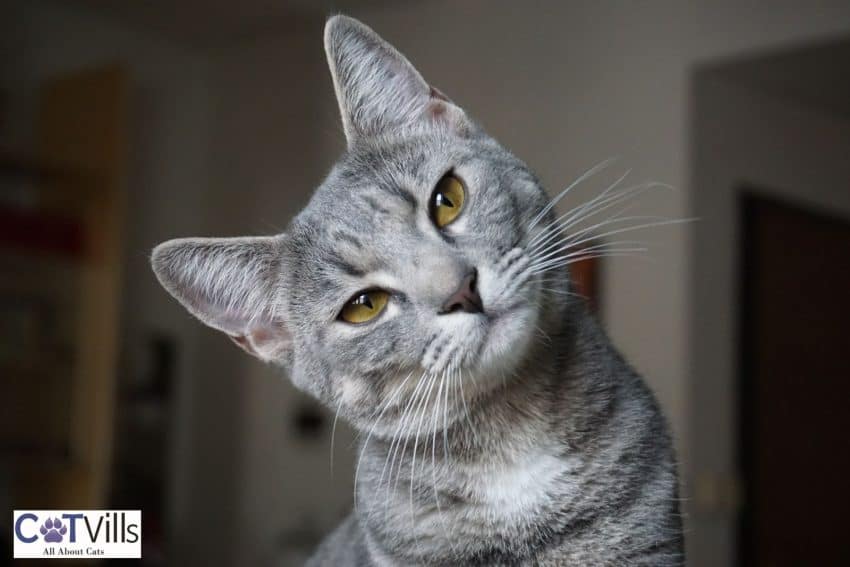
Cats use purring as a means of communication. But since cats have different personalities, it’s normal for some cats not to purr.
These felines use cat body language to communicate with their owners, relying on facial expressions and meowings to express their needs.
So, you don’t have a reason to panic if you’ve never heard your cat purring. It’s probably a perk of their personality, and it doesn’t mean that your cat is unhappy with you!
#2 Your Cat is Feral
Some owners have discovered a curious trend – feral cats tend to purr less than domestic ones.
The hypothesis is that feral mothers discourage their offspring from making these adorable sounds to prevent predators from discovering the nest.
Feral cats need more time to learn how to communicate with humans to solicit food and attention, so they rarely meow or purr.
However, when you earn your feral cat’s trust and bond with them, they will likely start purring.
#3 Vocal Cord Injury
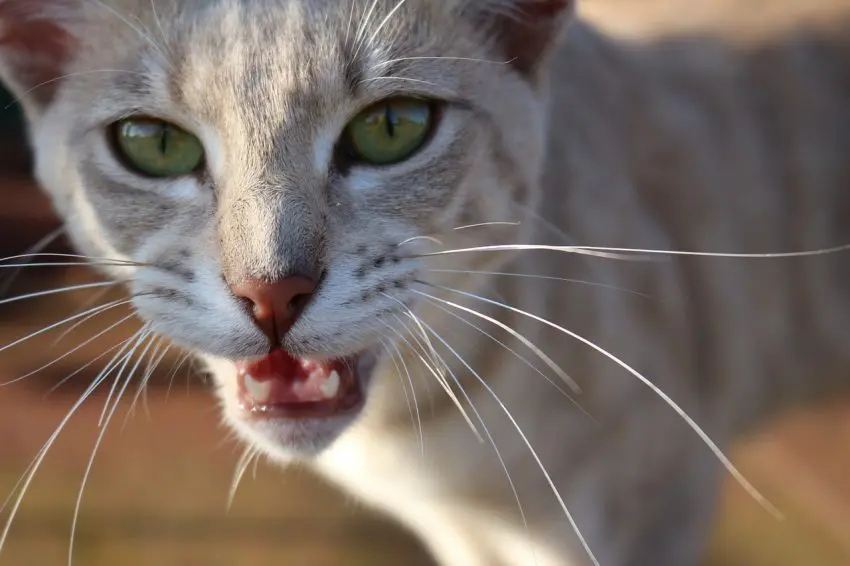
Why doesn’t my cat purr anymore? If your cat suddenly stops purring and meowing, you should consider the possibility of vocal cord injuries.
Trauma, infections, abscesses, and other medical conditions can make your cat unable to produce sounds, such as meowings and purrings.
Some infections are contagious, so if you have multiple cats, you should have your kitty evaluated by a vet to prevent the spread of the disease.
#4 Illness
While some cats purr to soothe themselves when ill, others are far too sick or lack the energy to produce these purring sounds.
If you notice that your cat has a poor appetite, sleeps more than usual, and doesn’t groom itself, you should make a vet appointment as soon as possible.
#5 Stress
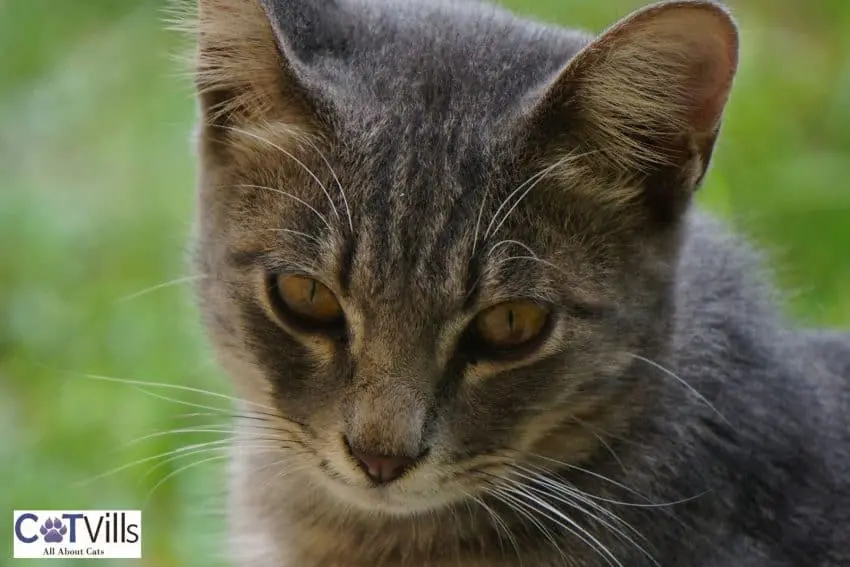
While purring can relieve your cat’s anxiety, some cats are too afraid or anxious to purr.
Maybe they think that the vibrating sounds will attract predators or get them bullied by other cats in the family.
Other signs of stress in cats include hiding, excessive meowing, loss of appetite, hissing, and urinating/defecating outside the litter box.
#6 Your Cat Is Old
Usually, kittens purr more than adult cats. So, if your cat is over seven years, they won’t be purring as much or as often as young kittens.
As long as your senior cat is healthy, you shouldn’t worry too much over their lack of purring.
#7 You Don’t Hear It
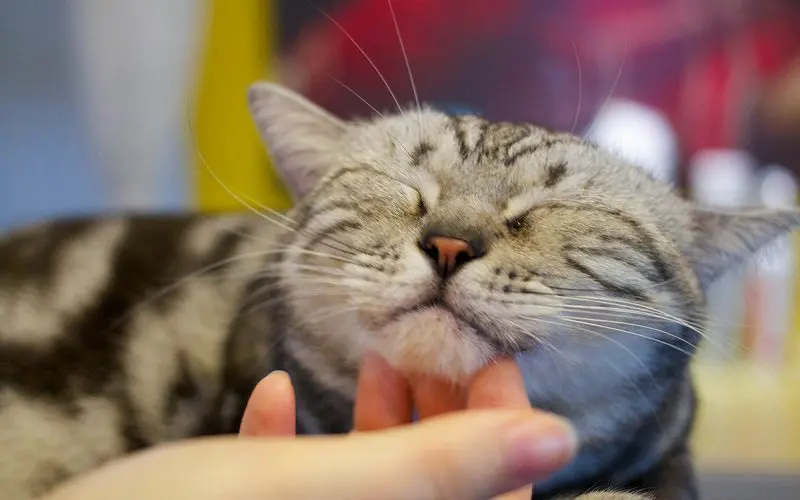
Why does my cat not purr? Maybe you’re not paying enough attention!
Some of my cats purr so loudly that I can hear them from a distance. But one has a soft purr, so you’ll never know she makes sounds unless you’re very close or put your hands on her body.
So, your cat may be the same – they’re purring, but so softly you can’t hear them!
Importance & Benefits Of Purring
Cats make many adorable sounds – from chirping to meowing and sighing. But purring is probably the most interesting one.
You’d think that there’s something unique about cats’ vocal cords to enable them to purr. But purring is related to the rapid movements of the larynx and the diaphragm.
When your cat breathes, the air touching the vibrating muscles produces a purr with a frequency of 25 to 150 Hertz.
Purring is far more critical than most humans realize. It has some unique benefits not only for the cats but also for their owners.
So, let’s talk about the importance and benefits of purring for cats and humans.
#1 Communication
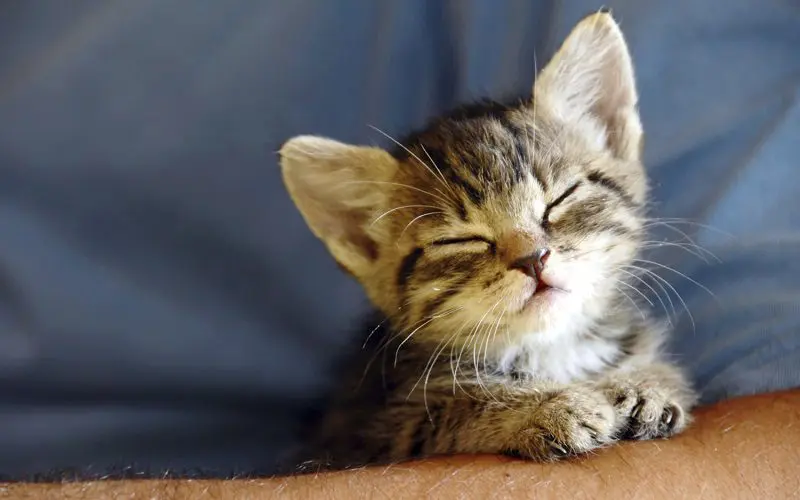
Why does my kitten purr all the time? Kittens are born blind and deaf, so purring is the only way to communicate with their mother and siblings.
As a study says, purring “would be used as an “all is well signal” by the kitten while they nurse.” And when the mother cat purrs, the vibrations guide the blind/deft kittens to the milk.
Moreover, many mother cats purr to soothe their kittens, calm them down, and encourage them to nurse.
Many kittens continue to purr into adulthood to express happiness when you pet them, scratch their chin, or feed them tasty treats. It’s a great sign of contentment!
#2 Calming Mechanism
The majority of cat owners think that only healthy cats purr.
However, purring has a calming effect on cats, so they often do it when in pain or under stress.
So, don’t be surprised when you hear your kitty purring while at the vet. Your feline friend is trying to soothe themselves!
#3 Bone Healing
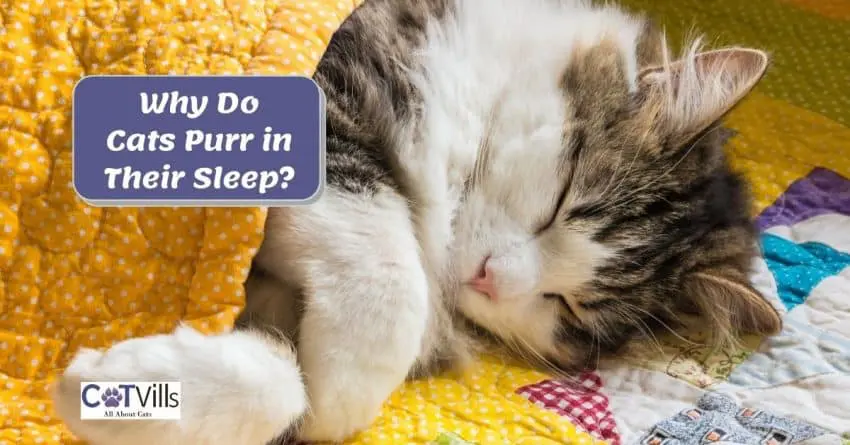
Why does cat purr while sleeping? The answer will surprise you!
As I already mentioned, the purring sound ranges from 25 to 150 Hertz.
According to studies, this vibration frequency can improve bone density, promote bone growth, and speed up healing.
The purring explains why cats don’t lose bone density even though they sleep more than 12 hours a day!
#4 Soliciting Food
You’d be surprised to hear that your furry friend purrs in one way when they’re happy and in another when they want something, usually food.
Karen McComb, an animal communication expert studying cat purrs, says, “Cats were embedding within this low-frequency purr a high-frequency cry that was similar to the pitch of a baby cry.”
Even people without cats classified this sound as urgent and grating. Karen McComb calls this behavior “a solicitation purr.”
#5 Keeping You Healthy
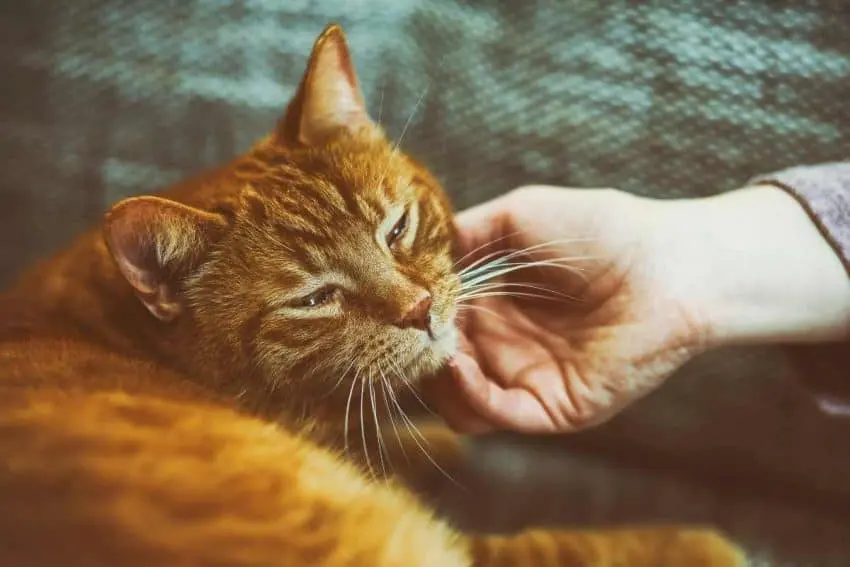
Do you know that you also reap benefits from your cats’ happy purrs?
The vibration frequency can lower your blood pressure, reduce the risk of heart attack, and relieve depression.
So, a cat is a great therapy animal and can help you recover mentally when you’re under a lot of stress.
How Do I Get My Cat to Purr?
Now you know the reasons why, but can you do anything to get your cat to purr?
Well, try these five steps to make your cat purr.
#1 Let Your Cat Come to You
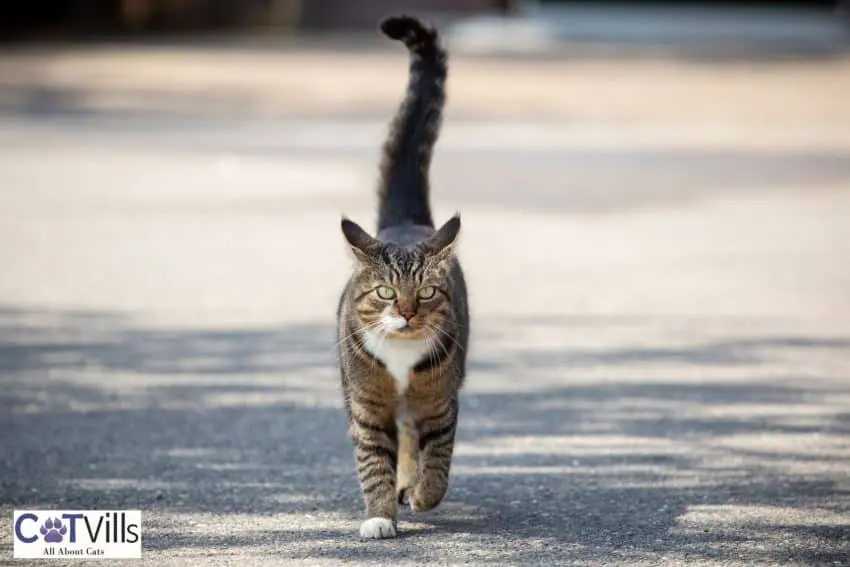
To get your cat to purr, you have to earn your cat’s trust and bond with them. Then it’s a matter of time before your cat starts purring.
So, it’s important not to force your kitty to interact with you. Let your cat come to you when it feels safe and comfortable, and reward it with tasty treats.
In this way, your cat will connect your presence with positive things and start purring.
#2 Hit the Right Spots
Cats love it when your pet them in specific areas. Some cats like it when you scratch them behind the ears or rub their chin; others prefer gentle pats along their back.
Keep an eye on your cat’s body language to determine which spots work for your cat and which don’t.
#3 Talk Gently
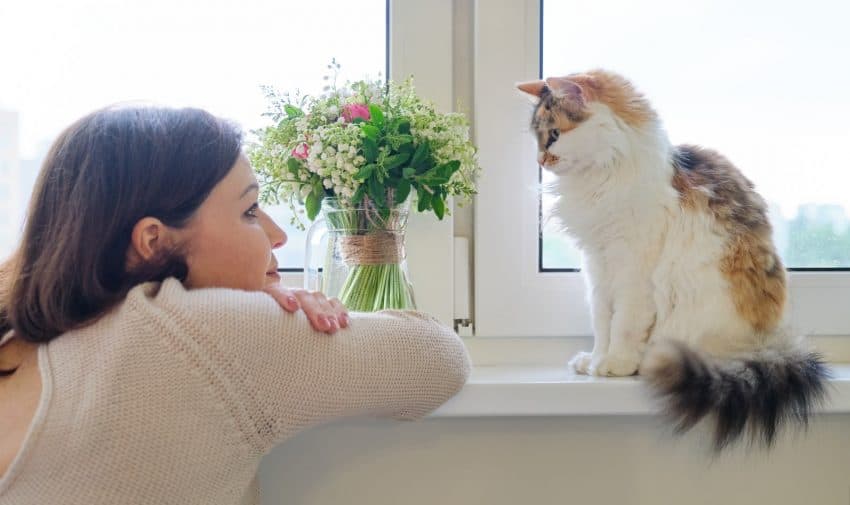
While cats don’t understand human words, they like it when you gently talk to them. So, talk to your cat as much as possible to get them comfortable.
You can mimic some purring sounds or play purring videos, to encourage purring.
#4 Cuddle
If your cat likes you to cuddle them in your arms or lap, you should use this opportunity to pet them to get your cat to purr.
For cats that hate it when you hold them, you can stay close to them to strengthen your bond.
#5 Reduce Stress
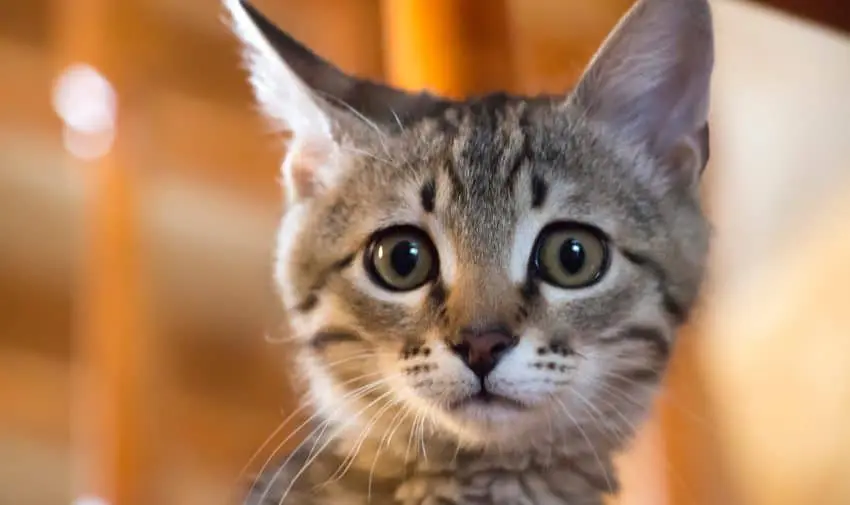
Finally, ensure that your cat isn’t under stress by keeping a predictable routine and resolving conflicts with other cats and pets.
Conclusion
Why doesn’t my cat purr? It’s normal for some cats not to purr because they’ve got other ways to communicate with their owners and express affection and trust.
Still, a cat that suddenly stops producing these cute vibration sounds might be sick, stressed, or in pain. So, you should mention it to your vet to ensure your kitty is healthy.
Does your cat purr when you pet them? Please share your experience with us in the comment section.
Resources:
